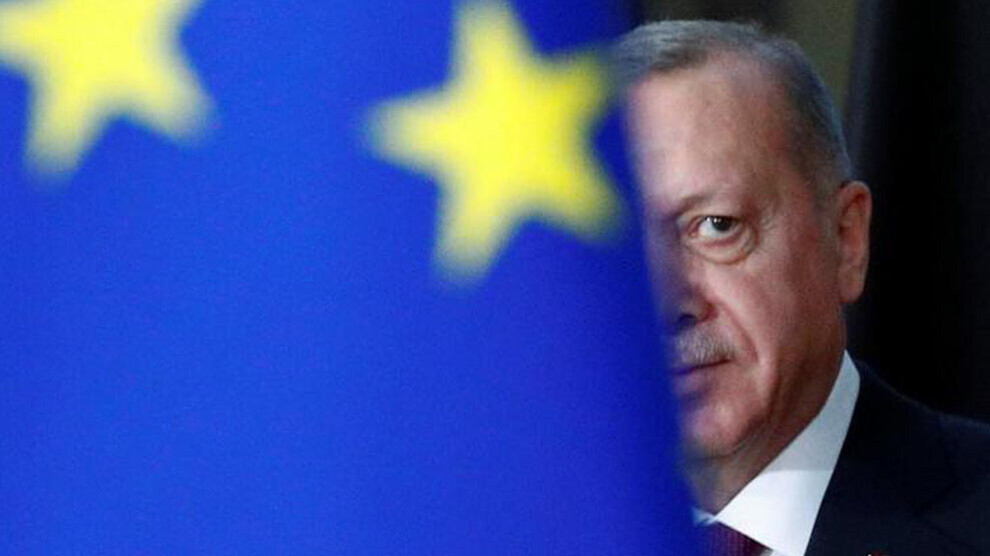EU summit agrees on further financial aid for Turkey
Notwithstanding the undermining of the rule of law and human rights, the European Union leaders have spoken out in favor of further financial aid for the care of Syrian refugees in Turkey.
Notwithstanding the undermining of the rule of law and human rights, the European Union leaders have spoken out in favor of further financial aid for the care of Syrian refugees in Turkey.

Notwithstanding the undermining of the rule of law and human rights, the EU also holds out the prospect of closer cooperation with Turkey. There is no more talk of the harsh sanctions that the EU had threatened the government in Ankara as recently as December in the dispute over illegal natural gas explorations near Greek islands and off Cyprus. The European Union is obviously only interested in Ankara taking action against unwanted immigration to EU countries.
European Union leaders on Thursday offered new incentives to Turkey to improve cooperation on migration and trade despite democratic backsliding in the country and lingering concerns about its energy ambitions in the Mediterranean Sea.
Seizing on the recent conciliatory tone from Turkish President Recep Tayyip Erdogan, the leaders said, should the relative calm continue, “the European Union is ready to engage with Turkey in a phased, proportionate and reversible manner to enhance cooperation in a number of areas of common interest."
This includes “a mandate for the modernization” of customs arrangements, the future launch of “high level dialogues” on issues like the pandemic, climate change, counter-terrorism and regional issues, and strengthened cooperation “on people-to-people contacts and mobility.”
The “customs union” agreement between the EU and Turkey removed duties on most Turkish goods and produce entering the 27-nation bloc, but has not functioned as well as the government in Ankara would like.
The leaders also ordered the EU’s executive body, the European Commission, to build on the EU-Turkey migrant agreement from 2016 and explore ways to continue to help finance the estimated 4 million Syrian refugees in Turkey, as well as those in Jordan and Lebanon.
That deal massively reduced migrant arrivals into the Greek islands, compared to 2015 when hundreds of thousands of people landed on European shores. Under it, the EU offered Ankara 6 billion euros ($7.1 billion) to help Syrian refugees and other incentives to prevent people from leaving Turkey to go to Europe.
The EU believes the deal saved countless lives, stopped most people from trying to cross the Aegean Sea to Greek islands like Lesbos and Samos, and improved life for refugees in Turkey. It wants to use the agreement as a model for similar arrangements with countries in North Africa.
But aid groups say the pact created open-air prisons where thousands have languished in squalid conditions on the Greek islands while others were blocked in Turkey.
The agreement ground to a standstill a year ago as the coronavirus spread and after Turkey encouraged thousands of migrants to leave, sparking clashes at the Greek border. Still, the EU is desperate for Turkey's help to keep migration in check, and in December extended two programs for Syrian refugees in Turkey worth almost half a billion euros (nearly $600 million) over a year.
But amid the offers, the leaders did warn that provocations by Turkey will prompt the EU to “use the instruments and options at its disposal to defend its interests and those of its member states, as well as to uphold regional stability.”
The EU leaders said they will assess progress again on EU-Turkey ties when they meet in June.
EU diplomats said before their videoconference summit that the leaders wanted to take advantage of a lull in tensions between Greece, Cyprus and Turkey in the eastern Mediterranean and to avoid any threats or sanctions that could undermine a new peace effort for divided Cyprus.
Periods of calm in EU-Turkey relations have quickly come and gone, and worrying trends concerning human and political rights in Turkey have continued.
Over the weekend, Erdogan ended his nation's participation in the Council of Europe’s Istanbul Convention aimed at preventing violence against women. The move was a blow to Turkey's women’s rights movement, which says domestic violence and femicide are on the rise.
Last week, the EU criticized Turkish authorities for stripping HDP MP Ömer Faruk Gergerlioğlu of his parliamentary seat and seeking to shut down the party.
RELATED NEWS: